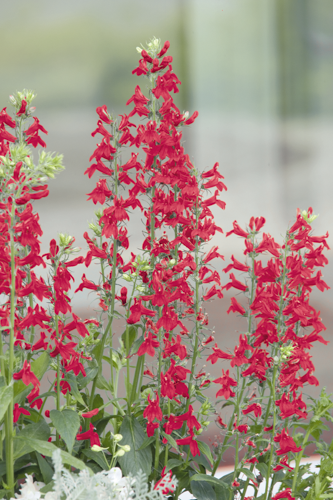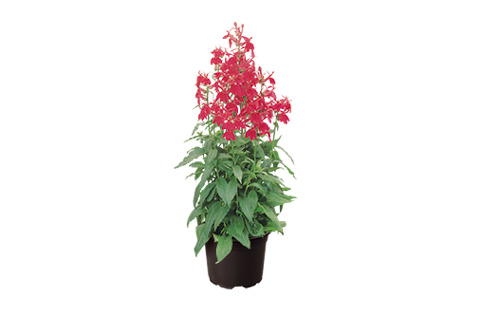

Fan® Burgundy
Item no.: LS2002P• FastraX perennial: First year flowering without vernalization
• Excellent branching of uniform plants
• Attractive red-green leaves of Scarlet & Scarlet Compact
• Fantastic germination: 90%+
Technical Guide: Click here
All information in our technical guide is based on our own trials and would therefore be as guideline only. Detailed cultivation aspects vary depending on climate, location, time of year and environmental conditions. Benary expressly disclaims any responsibility for the content of such data/information and makes no representation or warranty for the cultivation of any products listed. It is recommended that growers conduct a trial of products under their own conditions.
- Crop Time
- Spring: 18 - 20 weeks
- Height ∅
- 24 ″ / 60 cm
- Exposure
- Sun - Partial shade
- Seed Form
- Pelleted Seed
- Heat Zone
- 9-2
- Hardiness Zone
- 6-10
- Best Uses
- Pot Plant, Containers, Bedding
Culture guide
Usage
Pots, Containers amd Beds
Sow time
January-March for flowering in pots from July onwards, August-October for flowering in pots the following year, April-May for cut flower production outdoors
Sowing method
1 seed per plug for short day conditions 3-5 seeds per plug for long day conditions, because in long day the plants do not form a leaf rosette.
Germination
Optimum conditions for seedling development, beginning on the day of sowing until radicle emergence. Expect radicle emergence in 8-12 days.
Growing on
Transplant plugs after 10 weeks. Transplant one plant into a 4-6" (10-15 cm) pot, or 2-3 plants in a 6" (15 cm) or larger container. Apply a well balanced fertilizer every 2 weeks. Grow on at 60-65 °F (15-18 °C). Vernalization is not required for flower initiation.
Media
Plug culture: pH 5.8-6.2. EC 0.7-1.2.
Growing on: pH 5.8-6.4. EC 1.1-1.3.
Temperature
Plug culture: 20-22°C (68-72°F) until radicle emergence. Afterwards, ensure 18-20°C (64-68°F) during night and day. When the roots reach the bottom of the cell, the temperature can be lowered to 16-18°C ( 60-64°F).
Growing on: Maintain 16-18°C ( 60-64°F) during night and day. Once established in the final container, the temperature can be lowered to 10-15°C (50-59°F). Cooler temperatures support the uniformity, stability and compactness of the plants, even if the crop time increases somewhat. An outdoor production is also possible. In winter, a frost-free cultivation indoors at 3-5°C (38-40°F) or an outdoor cultivation with a fleece cover is possible. The plants are sensitive to strong frost temperatures.
Fertilization
Moderate-high fertilization levels are required. Fertilize the crop weekly with 150-200 ppm nitrogen (at 0 kg/m³ slow release fertilizer in substrate), using a complete balanced fertilizer. Avoid high ammonium and high nitrogen levels. Don’t fertilize after mid September. In spring fertilize with 100-150 ppm nitrogen of a complete balanced fertilizer. Prevent magnesium deficiency by applying magnesium sulphate (0,05 %) 1-2 times and in case of iron deficiency apply iron-chelate for 1-2 times. Field: If necessary according to analysis, improve the soil with 80-100 g/m² of a slow release fertilizer per year, applied in several portions.
Stage I Starts with the radicle breaking through the testa. The roots are touching the medium. Ends with fully developed cotyledons.
Stage II Starts from fully developed cotyledons. Ends with the fully developed true leaf or true leaf pair.
Stage III Starts from the fully developed true leaf or true leaf pair and ends with 80% of the young plants being marketable.
Stage IV All young plants are ready for sale and in the process of being hardened off. This stage lasts about 7 days.
The cultural recommendations are based on results from trials conducted under Central European conditions. Different conditions in other parts of the world may lead to deviations in results achieved.

